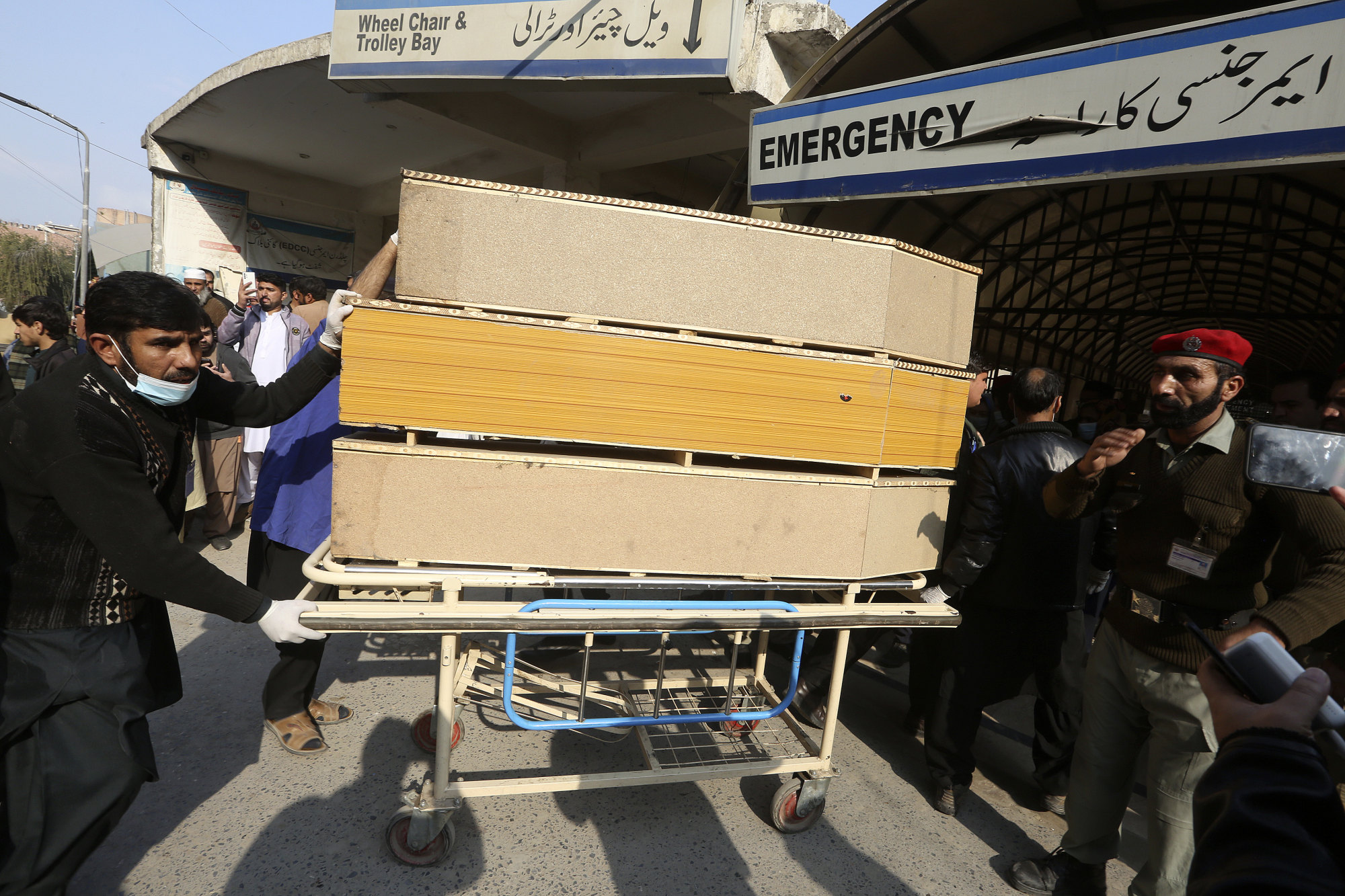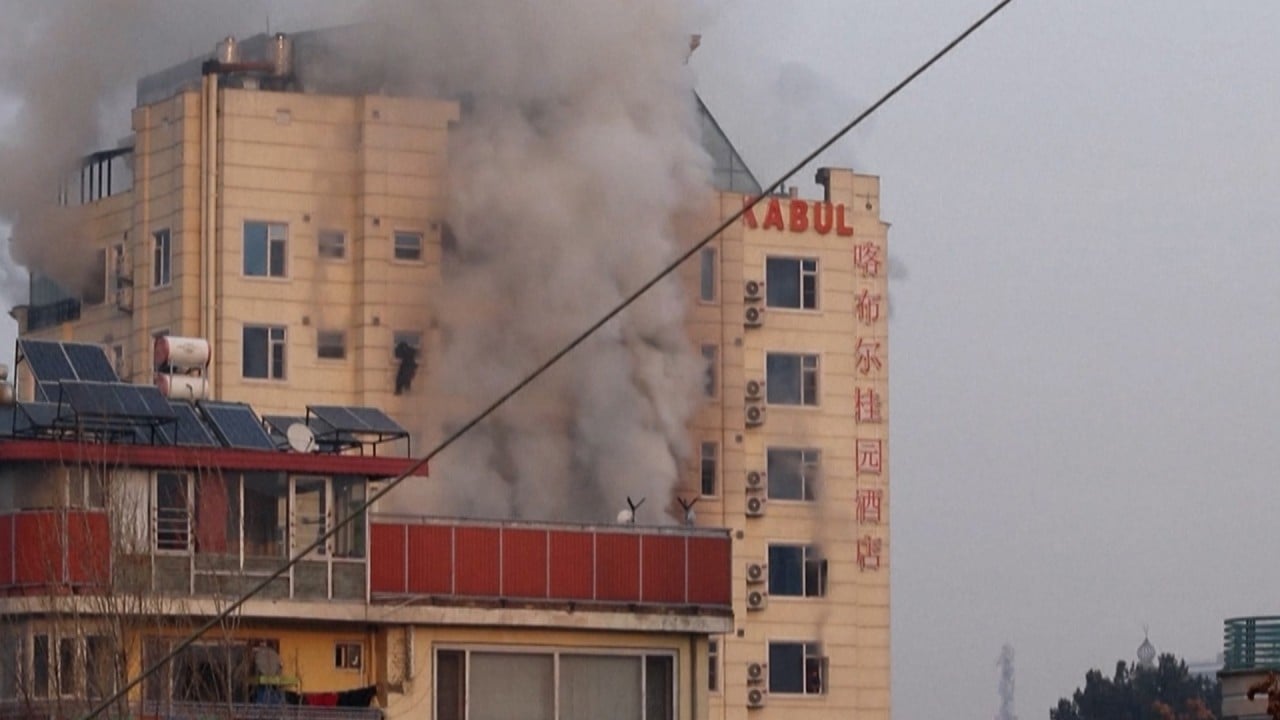
Pakistan suicide bomber kills at least 83, injures 150, during prayers; most victims were police
- The attacker struck in the city of Peshawar, where hundreds of people were praying or heading to mosque in a fortified compound which includes a police HQ
- Many of those injured are said to be in critical condition; a commander for Pakistani Taliban said the group was responsible for the attack
A suicide bombing during noon prayers at a crowded mosque in Pakistan’s Peshawar killed at least 83 people on Monday, the latest attack targeting police in this northwestern city where Islamist militants remain active.
Officials said more than 150 people were wounded, with many of them in critical condition.
“Many policemen are buried under the rubble,” said Peshawar police chief Muhammad Ijaz Khan, who estimated between 300 and 400 officers usually attend prayers at the mosque.
Bloodied survivors emerged limping from the debris, while bodies were ferried away in ambulances as the rescue operation continued.

Most of the casualties on Monday were police officers – the mosque is located within a sprawling compound which includes the headquarters of the provincial police force and a counterterrorism department.
The bomber detonated his suicide vest as worshippers were praying inside or heading to the mosque for prayers. The compound is located in a high-security zone and it was unclear how the bomber managed to penetrate so deep inside the zone unnoticed.
“We’re getting that the terrorist was standing in the first row,” Defence Minister Khawaja Asif told Geo TV.
There were fears the death toll would rise as many of the wounded were listed in critical condition.
There were at least 260 people in the mosque, said police official Sikandar Khan, with other officials saying as many as 350 were inside when the bomber detonated his explosives.
The impact of the explosion collapsed the roof, which caved in and injured many, according to Zafar Khan, a police officer.
Suicide bombing kills 19, mostly girls, at Kabul education centre
Footage from government broadcaster PTV showed police and residents scrambling to remove debris and carrying wounded people on their shoulders.
A survivor, 38-year-old police officer Meena Gul, said he was inside the mosque when the bomb went off. He said he did not know how he survived unhurt. He could hear cries and screams after the bomb exploded, he said.
Prime Minister Shahbaz Sharif condemned the blast, calling it a suicide attack, and ordered the authorities to ensure the best possible medical treatment for victims. He also vowed “stern action” against the culprits.
The city is the capital of Khyber Pakhtunkhwa province, which borders Afghanistan and has been the scene of frequent militant attacks.
It was Peshawar’s worst attack since March, when a suicide bombing at a Shiite Muslim mosque during Friday prayers killed at least 58 people and injured nearly 200. Islamic State militants claimed responsibility for that bombing.
The Pakistani Taliban have been blamed in similar suicide attacks in the past. The group, known as Tehreek-e-Taliban Pakistan or TTP, is an umbrella of Sunni and sectarian Islamist groups that want to overthrow the government.
The TTP has waged an insurgency in Pakistan over the past 15 years, fighting for stricter enforcement of Islamic laws, the release of members from government custody and a reduction of Pakistani military presence in the nation’s former tribal regions.
Pakistan has witnessed a surge in militant attacks since November when the TTP ended its ceasefire with government forces, a truce facilitated by the Afghan Taliban.
The truce ended as Pakistan was still contending with last summer’s unprecedented flooding that killed 1,739 people, destroyed more than 2 million homes, and at one point submerged as much as one third of the country. The authorities are still struggling to arrange tents, shelter and food for survivors.
Pakistan is also facing a severe economic crisis and is seeking a crucial International Monetary Fund bailout package. Talks with the IMF have stalled in recent months.
Additional reporting by Agence France-Presse, Reuters


